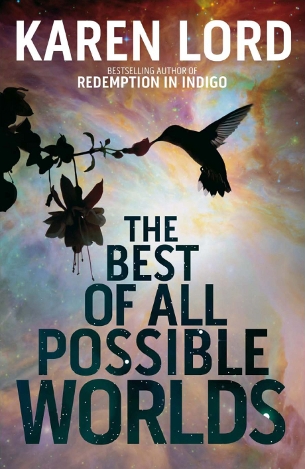Why you can trust GamesRadar+
The Best Of All Possible Worlds by Karen Lord book review: Life after wartime.
Karen Lord’s follow-up to the infectious fun of her debut Redemption in Indigo is, at first glance, a more sober proposition. Whereas Redemption was a freewheeling fantasy based on Senegalese folklore, centred on a man with an appetite like an elephant’s and the woman who tires of cooking for him, The Best of All Possible Worlds is a science fiction tale about alien cultures in contact. Yet the two books share the same irreverent but warm-hearted concern with people: how they see themselves, what they value, and above all how they relate to each other.
The contrast between the two novels echoes in the mismatched lead characters of Possible Worlds . Biotechnician and linguist Grace Delarua, whose gift of the gab is put to good use narrating most of the novel, sits at the impulsive and irrepressible end of the spectrum; offworlder Dllenahkh, meanwhile, is the very model of an inscrutable alien emissary, all quiet dignity and carefully marshalled words. Delarua’s impressions spill from the page in giggles and tears and chatty asides to her readers; Dllenahkh’s perspective on events is revealed to us in slivers, via a distanced third-person voice. Despite all this, it becomes steadily apparent – both to us and to the pair themselves – that the differences between them are not as great as they first appear.
A devastating covert attack on Dllenahkh’s home planet, Sadira, has made a scattered, shell-shocked remnant of his once-powerful people. Since the only ones to escape the disaster are those who were offworld at the time, and since prevailing Sadiri career paths and gender roles tend to keep women planetside, this remnant is also predominantly male. Desperate for a way to keep their community alive, Dllenahkh and a handful of other Sadiri embark on an expedition across the diverse world of Cygnus Beta, searching for distant genetic relatives of the Sadiri: basically, a wife-seeking mission. Delarua is one of the Cygnians chosen to go along, to smooth the path of contact with her scientific and linguistic know-how.
In most genre novels, the particulars of the attack – what happened, and whodunit – would be the driving force of the plot, but here they’re almost beside the point. The real story Lord wants to tell is how the Sadiri cope in the aftermath: how a society responds to near-annihilation.
Lord’s use of an SFnal setting to imagine variant forms of human (or human-esque) society recalls works like Ursula Le Guin’s The Left Hand Of Darkness and Mary Gentle’s Golden Witchbreed . Hard SF elements are integral to the background, but it’s the stuff of the social sciences that she focuses on: attitudes, rituals, hierarchy, myth. While she does sometimes get bogged down in having characters explain customs to each other, Lord explores nuanced issues with a light and thoughtful touch: chiefly, the question of what holds a people together, and indeed what makes them a “people” at all. Can the Sadiri survive in their current form, or must they compromise by acculturating and intermarrying with other societies? If they do, will some essential part of their identity be lost? When Delarua mocks Dllenahkh’s concern with Sadiri purity, he points out (politely, of course…) that it’s easy to be casual about such things when your people are abundant and thriving; much harder when you’re an embattled refugee minority mourning a homeland.
The pacing is choppy in places, and the novel as a whole would – unusually – benefit from being longer, to give its more complex episodes breathing room. But this is a rewarding, touching and often funny exploration of the forms and functions of human culture. Plus, it has flying monks - a universally improving ingredient!
Nic Clarke twitter.com/bibliolicious
Read our Redemption In Indigo review .
Read more of our book reviews .
SFX Magazine is the world's number one sci-fi, fantasy, and horror magazine published by Future PLC. Established in 1995, SFX Magazine prides itself on writing for its fans, welcoming geeks, collectors, and aficionados into its readership for over 25 years. Covering films, TV shows, books, comics, games, merch, and more, SFX Magazine is published every month. If you love it, chances are we do too and you'll find it in SFX.



